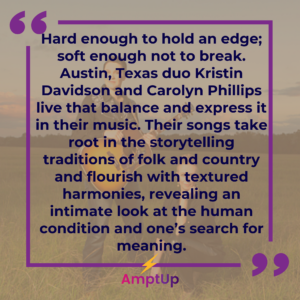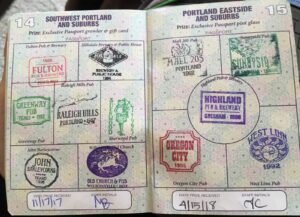
Take the Mystery out of Touring
After hundreds of hours of one-on-one interviews with top independent Venues and Musicians, we have uncovered the secret tips to building a tour that even touring Veterans will applaud. This how-to guide is for:
- anyone who’s been out of the game for a while (Hello, COVID!)
- accomplished Musicians (who may be touring newbies)
- and even touring regulars
And…well, the times, they continue to be interesting, don’t they? Musicians and Venues both need to get used to the idea that at least for the next year, you may need to relearn how things work every three months, and adjust. We’ll be here to make the process easier.
Word on the Street: What’s the Pitching Climate?
Musicians and Venues are both telling us that May-August was extremely difficult to get a response from Venues, as every “Musician who ever learned guitar was getting back out on the road.” (overheard at NIVA Conference, National Independent Venues Association) While simultaneously, the 2021 audiences that had flooded Venues after the shutdown, were much lower and had been scared away again with Omnicron.
Now things are evening out, so it’s a good time to plan a winter or spring tour.
If you’ve always wanted to do a tour, or you’ve been wanting to get back in the saddle after time off. Take a quick moment to check in with yourself about why you may be delaying. Is it a simple reason like COVID case numbers? Or is it connected to fear or not knowing how to reach an unknown market?
Let’s start by going step by step into what you need to do to get booked for a tour more easily.
Want to learn straight from the experts? Join our touring webinar.
Routing a Tour 101 – The Basics
Create or Update Your EPK
An EPK, which stands for “electronic press kit,” is the digital equivalent of the physical press kits that artists send out to Venues, event organizers, or festivals to promote themselves or book shows.
The most important thing is to get. it. Done! Don’t labor over it, and wait until the words are perfect…get it out, then refine it later.
Let’s collect all the info you’ll need for your EPK…
Define Your Artistic Identity First
You need to have a firm grasp on your artistic identity before you start connecting or sending out emails. Take some time away from the spotlight to figure out who you are and then present it to the world. The details include defining your existing sound and image, describing your experience, and describing your audience (who loves you? How do they feel when they listen to your music? Are they dancing in the aisle, or contemplating life?), listing your equipment, and so on.
When we break EPK down into sections, it looks like this (in order of priority):
1. Biography: We know…it’s really hard to talk about yourself in a way that isn’t too much or even worse, too little and it doesn’t draw them in. The narrative of your art goes here, and it should leave a talent booker with the idea of your sound, success, and goals. This part should be easy to write after you set up your narrative.
You can start by laying out the facts of your experience. Then go back and add in what you’ve heard people say about you. Do you have any awards or been featured in the press, or played at or with names that people you’re pitching will know? Add that in. Then, go back and revise it to be about 700 characters with spaces.
Here’s an example of something that immediately draws you in and makes you want to take a listen (from a real band):

2. Your Music: Feel free to highlight a variety of your music to appeal to different audiences. Remember that, surprisingly, AmptUp’s interviews with Venues told us that a Musician’s songs aren’t always easy to find.
So make it clear and easy to find. Send a link to your songs, don’t attach the files.
3. Your Socials & Your Draw: Love it or hate it, a Talent buyer is going to look to your social media to see how you engage fans, and how many people follow you. To be fair to them, it’s really all they have to know how big of a draw you have. Attach links, and even better, note how many followers you have on each. Additionally, if you know roughly how many people you can bring in, let them know (ie: “I can generally bring in about 50 people to Austin shows”).
4. Your Performance Calendar: Include the places you’ve played – especially in the Venues near the one you’re pitching – they want to see that you have a fan base in their area. Keep your performance calendar revised and update it often.
5. Videos of Your Best Performances: Talent bookers want to see what you sound and look like on stage, not in a curated music video. Videos of you playing a live show do the best job here, while it doesn’t need to be professional, you don’t want shaky old videos with bad sound.
If you see a professional taking video, ask them if you can get a 30-second clip, and include it. It’s even better if you can include shots of the audience’s engagement. If you have a friend who has some video skills, give them your phone. Having something is better than nothing if it shows a crowd loving YOU.
6. Photos of You and Your Band: Pictures also help to tell a Musician’s story in addition to the music.
7. Stage Plot: Musicians use a stage plot to provide the stage crew and sound engineer with crucial setup info regarding mics and inputs when performing at Venues, festivals, or with multiple acts. By making this information available to the Venue ahead of time, problems can be resolved before the day of the performance, and the concert can go off without a hitch.
8. Your equipment: Let the Venue know what you’ll bring. Even places that have regular live music may need to know that you bring a PA…perhaps you’ll be playing a special patio performance, that’s not set up for regular music.
9. Notable band members: You never know who knows who or what can spark a conversation or someone’s interest. Maybe the talent buyer knows your drummer. List out your regular players.
10. Your Press Coverage: Interviews and endorsements from news outlets can generate the greatest trust in your work; include any you’ve received.
11. One Sheet Summary: Short and sweet is critical. Try to keep this to just one page.
12. Your Contact Information: Contact information must be an EPK focal point. Beyonce’s people only call once!
Want to learn straight from the experts? Join our touring webinar.
Create your elevator pitch
Essentially, it is 3 short sentences as a spoken resume. You better have an answer ready for LA REID’s “Who are you and who do you sound like?” question. Rehearse your elevator pitch just like you would your music!
Next, build a network (or expand one)
Ahead of making contact, it is important to learn as much as possible about the people you will be chatting with and the setting you will be visiting. This can help you in recognizing when a certain place is a stretch, for example. If you usually sell 50 tickets in your area, don’t pitch a Venue that doesn’t play your genre or has a capacity of 1,000 people. This would not be a stretch, it would be annoying for the Venue. However, pitching a 300-person Venue that your friend played (who can do an intro), would be a great stretch.
Also, keep all the info of tour managers, event organizers, and relevant people you’ve met or are planning to pitch! Keeping your data structured in a spreadsheet is a fantastic way to recall the details of a person or the Venue’s details. You can organize everything into tabs for each geographic area, with separate columns for each of the following: name, address, email address, phone number, and background info (who they are and what they book for).
Most importantly, work together with Musician friends to share contacts, and make intros. The best way to do this is to find similar-sounding bands and:
- Plan tours back to back. For example, if you plan a tour with 2 other bands, you all agree that after the first band completes the tour, they make email introductions to the next band. A warm intro after a positive experience gets you miles ahead of all the other pitches.
- Partner with similar bands to create a ready-made bill for the talent buyer. Choose a band either from the area that has a local draw you can speak to, or bring a band with you (the first being much more powerful, but more work).
The music industry is exceedingly small; everyone knows everyone. Start hustling and go out and meet people!
Find Venues in a Far Away Land
Finding the right Venues is the hard part
Here is a list of our favorite tools and resources:
- Your friend network: Ask other Musicians for their spreadsheets and where they’ve played. Most importantly, ask for warm email introductions!
- Yelp & Google: search the city you’d like to go to and “live music.” When you find a few good Venues, search the Musicians that played there, and look at their schedule to see what other Venues they play.
- Indieonthemove.com: with a paid subscription you can have access to 10-30 Venues per city (medium and big cities)
(In our upcoming article “Tech tools to Make Touring WAY Easier”, we’ll give you the top free tech tools to make your life easier.)
Pitching Talent Buyers
Prepare Your Pitch
Do Your Research
Creating the perfect pitch starts with the research you’ve done so you know who you are speaking to. Include all that you’ve learned about the Venue: talent booker’s name, available dates, target audience, similar bands who have played there before, and location.
Don’t Play Nearby Within 2-3 Weeks
If you’re playing at a Venue down the street the day before, it will be hard to create a buzz and sell tickets for a nearby Venue. This is a courtesy to the talent booker. MANY Venues have told us that this is their pet peeve. Most likely you will never know that they even found out, they will just stop responding to you.
Be Clear
Be human and kind, but get to the point. Don’t give ambiguous dates, be specific. For example, instead of this: “I’ll be there in the summer, do you have any openings?” Say this: “I’m going to be here the third week of July”.
Important Things To Include in the Email Pitch
- Social Media counts, draw, or past ticket sales you have in their area
- names of where you’ve played before (only that they would know or in their area)
- links to your music
- your EPK or one sheet with everything included (Venues prefer a link to a digital EPK, not an attachment)
- a VERY quick mention of any press or awards you have won…this takes work and time to create.
Bonus Tips on Crafting Your Pitch:
- Follow Up!
- Follow Up!
- Follow Up! Get out your calendar and mark the date that you will follow up so it doesn’t get missed. Waiting 3-5 days is plenty.
- Be creative. Try pitching for an off night at a stretch Venue, maybe a Thursday night spot instead of Saturday. Future Venues will never ask you what night of the week you played.
- Reference your network – Remember to pitch yourself in a full bill with other bands the audience will like, which makes the Talent Buyer’s job much easier. Or, reference your network to make the communication more warm and familiar for the booker.
- Keep all communication organized and be immediately responsive.
Here’s a sample email for you to check out:

How & What to Negotiate
Yay! You’ve received a response! Now starts the actual booking process. Remember that you want to always be booking at least 60 days out. This will give plenty of time to sell tickets, and negotiate. Being educated on your worth, Venue needs, and how big of a reach this will be for you will help you negotiate intelligently.
- First, budget yourself and know what you will need to break even or make a profit. Pay attention to the industry standards. Be aware of booking house rules and how the Venue books. This should be an element of your research you should not skip!
- While many of us are fighting for a change you must be aware that there will be gigs in your career where you walk away losing money and this may be okay if the gain is exponential exposure and good contacts.
- Streamline band communication and make sure they know the deal. Before sending the final pitch get your band together. Get them all on the same page, and do this quickly. A big Venue pet peeve is long lag times as the band figures out availability and other details.
- If you hired Musicians individually, pay your Musicians. I have never met a band leader who paid themselves first, so this likely goes without saying…Unless they are investing in the band, they are working Musicians too. If you want to be treated with respect make sure you respect and communicate with your Musicians. You don’t want to get halfway through the tour and someone drops out. It is also a good idea to have backups. You could possibly start with a smaller tour. Maybe duo or trio before you start a full band.
- Your reputation is everything so ensure you can deliver what you signed up for.
Final tips for before and after the show
- Get your marketing assets and stage plots to the booker as soon as possible so they can start promoting you.
- Have a person to help you when needed & always be respectful to the sound engineer as well as the talent booker.
- You are a business, always keep this in mind!
- Be 100% prepared for your show.
- Thank the Venue, and send a thank you note after you play.
In our upcoming article “Tech tools to Make Touring WAY Easier,” you’ll see how AmptUp was built as an innovative solution to bring the Venue owners closer to the Musicians, and vice versa.
Want to learn straight from the experts? Join our touring webinar.
About AmptUp:
AmptUp is a mission-based, online marketplace that streamlines the booking process making sure you get found, paid, and that you’re upping your game professionally. There are no subscription fees or pay-walls to use our patent-pending Tour Routing Tool, just a 10% fee anytime you receive a gig on AmptUp. We want to level the playing field so everyone has access to the same tools.
Our Mission is:
- To make it easier for Musicians to make a living
- To diversify the stage.
- To make ANY city a ‘music city.’






